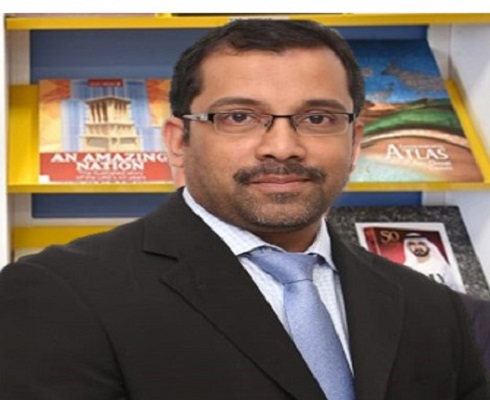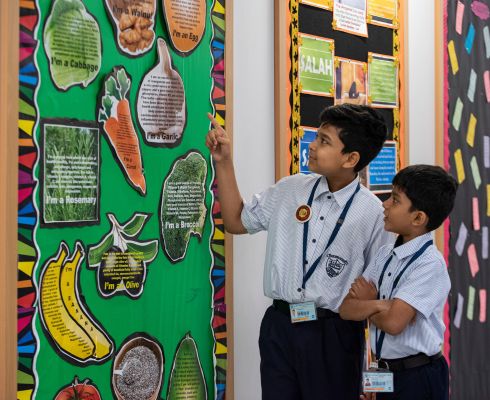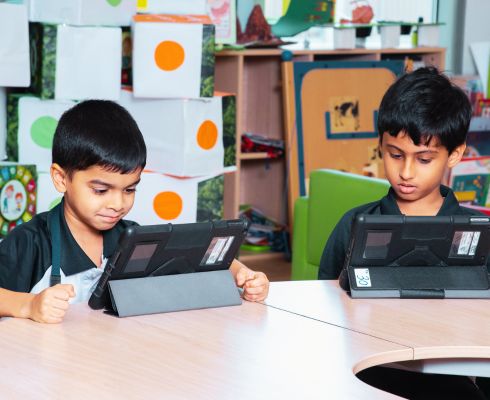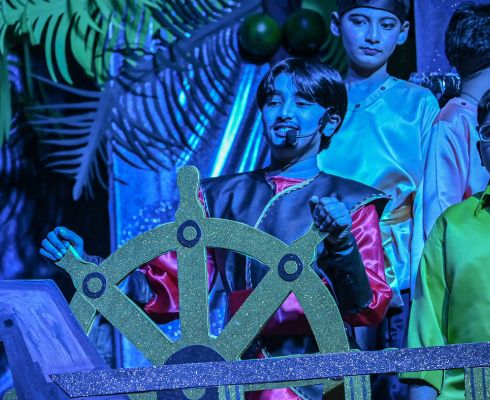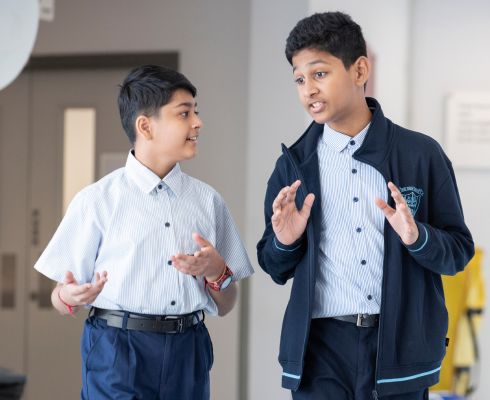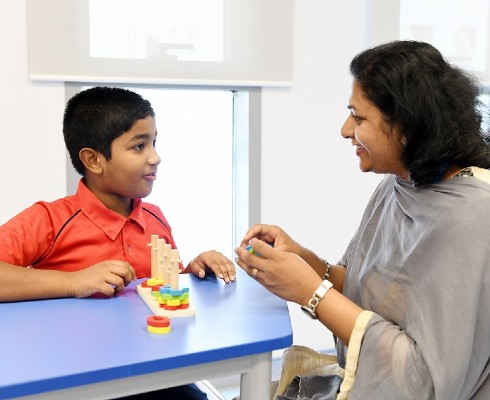Secondary & Senior
Welcome to the Secondary and Senior Secondary School at Our Own English High School Sharjah - Boys'
GEMS envisions the all-round development of students in consonance with the holistic approach to education and therefore, emphasizes integration of cocurricular domain with curricular domain in an equitable manner. The Secondary Curriculum provides students a broad and balanced understanding of subjects including languages, Mathematics, Science and Social Science to enable students to communicate effectively, analyse information, take informed decisions, construct their worldview in alignment with constitutional values and move ahead in the direction of becoming productive citizens. The recent focus of CBSE is on the development of 21st century skills in settings where each student feels independent, safe and comfortable with their learning.
OOB is also trying to align curriculum in a way so that children feel more connected to it and employ their learning in real life contexts. To achieve this aim, it is extremely important that children acquire adequate knowledge and skills in other core areas like Health and Physical Education, Life Skills, Values Education, Art Education, Work Education and other Co-Scholastic areas. In operational sense, the secondary curriculum is learner-centered with school being a place where students would be acquiring various skills; building self-concept, sense of enterprise, aesthetic sensibilities and sportsmanship.
Therefore, for the purpose of fostering core competencies in learners, this curriculum encompasses major learning areas, from scholastic and co scholastic point of view. For the current session OOB is offering curricula in English, Science, Social Science, Math - Standard and Basic, Information Technology, Artificial Intelligence, Hindi, Malayalam, French, Urdu and Arabic.
Growth of Knowledge and Skills
The Senior Secondary stage of education determines the course of life of a student. At this stage, it becomes extremely important for students to develop the right attitude, a willingness to learn and an understanding of the world around them and to be able to take the right decisions for their future. The senior secondary curriculum is expected to provide the necessary base for the growth of knowledge and skills, and thereby enhance a student's potential to face the challenges of global competitiveness. The Senior Secondary Curriculum aims at developing the desired professional, managerial and communication skills as required in the world of work.
The curriculum has been designed to nurture multiple intelligences like linguistic or verbal intelligence, logical mathematical intelligence, spatial intelligence, sports intelligence, musical intelligence, inter-personal intelligence and intra-personal intelligence. For the current session OOB is offering curricula in Physics Chemistry, Biology, Accountancy, Business-Studies, Economics, Computer Science, Information Practices, English, Mathematics, Applied Mathematics, Physical Education, Typography and Computer Application.
Secondary Subject Overview
-
Physical Education
PE develops students' competence and confidence to take part in a range of physical activities that become a central part of their lives, both in and out of school. A high-quality PE curriculum enables all students to enjoy and succeed in many kinds of physical activity. Physical Education is a vast subject and it has been given importance from ages. Modern Physical Education stresses on balanced development of body and mind. The students are bound to understand the importance of nutrition, fitness and healthy living.
The students through their experiences of sport they develop agility, balance, co-ordination, speed, strength and endurance. In addition, key transferable skills such as leadership and teamwork which are integral to Physical Education lessons are developed.
-
Arabic
The Arabic curriculum represents an important step toward fulfilling the needs of learners of Arabic as an additional language. It is also consistent with UAE's National Agenda for 2021 with regards to the priority of improving the learning of Arabic language. This Curriculum focuses on enabling non-Arabic speakers who are learning Arabic to communicate in real life situations inside and outside school. The Curriculum is based on the standards set by the UAE ministry of Education, and based on international principles and expectations applied in the teaching of foreign languages to non-native speakers.
The Curriculum is also adapted to meet the UAE's aspirations in the teaching and learning of Arabic in a manner that suits the learners’ capabilities and their learning environment. The Curriculum illustrates the levels expected to be achieved by the learner in each of the four language skills (listening, speaking, reading and writing). It links the achievement of these levels to the number of years spent in studying Arabic, regardless of the learner’s current grade.
-
Artificial Intelligence
Artificial intelligence (AI) is a wide-ranging branch of computer science concerned with building smart machines capable of performing tasks that typically require human intelligence. Artificial Intelligence is offered as a 6th optional subject at grades 9 which is continued in grade 10. The CBSE AI curriculum focuses on building an AI mindset and relevant skillsets and toolsets. This AI curriculum for schools introduces students to domains such as computer vision, natural language processing, data and how they can use these concepts to make real-world based projects that are meaningful and have a positive social impact.
-
Data Science
Data science is an interdisciplinary academic field that uses statistics, scientific computing, scientific methods, processes, algorithms and systems to extract or extrapolate knowledge and insights from noisy, structured, and unstructured data. Data science is multifaceted and can be described as a science, a research paradigm, a research method, a discipline, a workflow, and a profession. Data Science is offered as a 6th optional subject at grades 9 which is continued in grade 10. The CBSE lays the foundation for Data Science on understanding how data is collected, analyzed and, how it can be used in solving problems and making decisions. It will also cover ethical issues with data including data governance and build the foundation for AI-based data science applications.
-
English
At OOB, the courses in English Language and Literature and English Core at the Secondary and Senior levels, aims to develop learners who are confident in working with information and ideas, responsible for their learning, reflective, innovative and equipped for new challenges and engaged intellectually and socially. The course aims, essentially, at promoting the higher-order language skills, develop greater confidence and proficiency in the use of the language skills, build communicative competence in various lexicons of English and develop ability and acquire knowledge required in order to engage in independent reflection and enquiry.
Speaking and listening skills better the interactive competence, fluency, pronunciation and language accuracy. Writing skill stresses on the ability to seek relevant information, lodge complaints, express gratitude, render apology, draft papers to present, express opinions, facts, arguments and constructing accurate sentence structures. Reading skill is developed to create independent thinking individuals with the ability to not only create their own knowledge, but also critically interpret, analyse and evaluate it with objectivity and fairness.
Learners are expected to show the ability to appreciate how different texts are shaped by their language and style. Furthermore, learners have chances to create their own imaginative and persuasive writing for different purposes and audiences as well as engage in researching, selecting and shaping information from different sources. A final component of the syllabus is that learners need to display the ability to analyse and compare written and spoken texts in close detail.
The Core Course at the Higher Secondary level caters to both by promoting the language skills required for academic study as well as the language skills required for the workplace. Throughout the course, learners will be encouraged to practise their skills in close reading through the study of literary extracts and unseen texts; developing skills of analysis and interpretation of texts, alongside their expression of personal response to the texts studied.
-
French
We lay a strong foundation to create a well-rounded speaker of a language by building upon the four foundations, reading, writing, speaking and listening. Our students explore and learn through different strategies, skills and assessment to get fluency. They learn different cultures, cultivate tolerance and respect every individual. Their learning is evident through the role plays, video making, storytelling, poetry recitation, letter writing, research and project work they do.
-
Hindi
We aim to develop the reading, writing, speaking and listening skills of the students through the extensive study of the Hindi language and literature. The students are provided with ample scope to develop effective and coherent writing with accurate grammar, punctuation and spelling. Through their studies they will also gain an insight into, and a positive attitude towards, other cultures and practices. Students also develop the skills to analyze texts to extract meaning through gist and inference, improve memory skills as well as expressing and justifying their points of view, attitudes, emotions and apply the same, in day today life. The course lays the foundation of promoting higher-order language skills, thereby leading the pupil to gain greater confidence and proficiency in the use of the language skills.
-
Malayalam
Children are engaged through opportunities for meaningful communication where they use contextual cues and prior knowledge for a real purpose. Children’s language learning is increased through opportunities to produce language orally, non-verbally and in writing, in meaningful contexts, throughout the school day (language).
-
Mathematics
According to the National Curriculum Framework (NCF) 2005, the main goal of Mathematics education in schools is the 'mathematisation' of a child's thinking. Clarity of thought and pursuing assumptions to logical conclusions is central to the mathematical enterprise. The skills to handle abstractions and an approach to problem solving comes along with it. It also includes a child’s understanding of the basic structure of Mathematics: Arithmetic, Algebra, Geometry, Trigonometry, Commercial mathematics, Calculus, Mensuration, Statistics, Probability - all of which offer a methodology for abstraction, structuration and generalization. The curriculum also provides students with an appreciation of the wide variety of the application of Mathematics, and equips them with the basic tools that enable such application. It also facilitates acquisition of 21st Century Skills and enhances self and social awareness among students.
-
Moral Education Programme
The Moral Education Programme (MEP) covers four pillars of teaching and learning: character and morality, the individual and the community, civic studies, and cultural studies. The program blends academic content with an exploration of character and ethics, which focuses on the key elements of ethics, personal and community development.
-
Science
The present Science syllabus plays an important role in developing abilities in cognitive, affective and psychomotor domains in children. It augments the spirit of enquiry, creativity, objectivity and aesthetic sensibility. It has been designed around seven broad themes viz. Food; materials, The World of The Living, How Things Work, Moving Things, People and Ideas, Natural Phenomenon and Natural Resources. Special care has been taken to avoid temptation of adding too many concepts than can be comfortably learnt in the given time frame. At this stage, while science is still a common subject, the disciplines of Physics, Chemistry and Biology begin to emerge. The students are exposed to experiences based on hands on activities as well as modes of reasoning that are typical of the subject. Our syllabus engages young students with exciting material and experiences, motivates them to learn and pursue the science in the senior grades. Teaching technological literacy, critical thinking and problem-solving through science education gives students the skills and knowledge they need to succeed in school and beyond. -
Social Studies
OOB’s Social Studies Department is committed to helping students become creative and independent thinkers by guiding them in the understanding and analysis of important political, geographic, economic, legal and social issues of our contemporary and historical world. It acts as a guide to our diverse student population in realizing their potential as citizens of a democratic nation and members of our local community.
-
UAE Social Studies
UAE Social Studies covers geography, culture, world history, local history and civics through storytelling and project-based learning. The curriculum aligns with the UAE Ministry of Education National Social Studies Standards and emphasizes links and relationships between groups of people through change, communications, diversity, science and society. It encourages students to be responsible citizens and residents of the UAE and the world. The stories, characters and learning outcomes preserves UAE culture, heritage and traditions and profiles UAE’s leaders and iconic figures. Our lesson plans and activities are research-based and come with assessment techniques. The curriculum is customized to help students to be informed to make decisions for the democratic society in an interdependent world, according to their learning and individual needs. It has come with appropriate age stories with characters based on historical figures. The curriculum also compressed of Maps from pre-historic period to the present UAE and the world.
-
Urdu
We lay a strong foundation to create a well-rounded speaker of the Urdu language by building upon the four skills, reading, writing, speaking and listening. Our student learns through different strategies, skills and assessment to get fluency. Through their studies they will also get insight into, and a positive attitude towards other culture and practices. Students also develop the skills to analyze texts to extract meaning through the gist, summary writing and inference, improving memory skills, as well as expressing and justifying their point of views.
Science Department - Senior
-
Biology
The present curriculum of biology promotes understanding of basic principles of Biology. It encourages learning of emerging knowledge and its relevance to individual and society and promotes rational/scientific attitude towards issues related to population, environment and development. It enhances awareness about environmental issues, problems and their appropriate solutions and create awareness amongst the learners about diversity in the living organisms and developing respect for other living beings. The curriculum appreciate that the most complex biological phenomena are built on essentially simple processes. It is expected that the students would get an exposure to various branches of Biology in the curriculum in a more contextual and systematic manner as they study its various units.
-
Chemistry
The existing curriculum for Chemistry at the Secondary and Senior Stage aims to stimulate understanding of basic facts and concepts in Chemistry while retaining the excitement of the subject. It makes students skillful enough to study the subject in academic and professional courses such as medicine, engineering and technology at tertiary level. The present curriculum exposes the students to various emerging new areas of Chemistry and apprises them with their relevance in future studies and their application in various spheres of chemical sciences and technology.
It equips students to face various challenges related to health, nutrition, environment, population, weather, agriculture and also develops problem solving skills in students. Our curriculum exposes the students to different processes used in industries and their technological applications. It acquaints students with interface of Chemistry with other disciplines of science such as Physics, Biology, Geology, Engineering, Biomedical field etc. Our curriculum apprises students with different aspects of Chemistry used in daily life. It also develops an interest in students to study the subject as a discipline and also integrates life skills and values in the context of chemistry.
-
Data Science
The world we are part of is highly data-driven. Data Science is an interdisciplinary field of study that enables the corporate world to study this gigantic volume of data to make meaningful insights. Thorough use of data analysis techniques yields fitting solutions to complex business problems resulting in a hike in the profit graph. It is not a surprise that Data Science is considered one of the best lucrative job fields of the 21st century.
CBSE has introduced data science for class VIII-XII in a tie-up with Microsoft, to equip school students with ample knowledge and understanding of one of the trendiest fields of study. The Data Science Curriculum is focused on building critical thinking, computational skills, problem-solving skills, creativity, and hands-on exposure to new technologies.
Some of the key features of the curriculum include:
- Introduction to Data and Data Science; Ethics in Data Science and Data Governance
- Data Visualization and Use of statistics
- Assessing data and forecasting data
- Introduction to R studio
- Supervised and Unsupervised learning algorithms
- Projects on data science
OOB has taken a bold step to inculcate the new field of study in the scheme of studies. This is done in perfect alignment with the sole goal and vision of the school, which is to make our boys future-ready in every possible way.
-
Computer Science
The Computer Science curriculum for senior secondary students (Grades XI and XII) emphasizes the development of computational thinking, problem-solving skills, and practical proficiency in Python programming. Students explore various topics including data types, algorithms, computer systems architecture, and Boolean logic. The curriculum also covers societal and ethical issues related to technology, such as cyber safety and intellectual property rights. In Grade XII, students delve deeper into functions, file handling, data structures, computer networks, and database management, including SQL and Python-SQL connectivity. Practical exercises and projects are integral, ensuring students apply theoretical knowledge to real-world scenarios, enhancing their readiness for further studies and careers in information technology.
-
Information Practices
The Informatics Practices curriculum for Grades XI and XII is designed to provide students with a thorough understanding of computing and its applications, focusing on practical skills in Python programming, database management, data handling, and data visualization. Students will learn to create and manipulate data structures, design and execute SQL queries, and understand the components and functions of computer systems. The curriculum also covers emerging trends such as AI, ML, and IoT, and explores the societal impacts of technology, including issues related to cybercrime and digital ethics. Through hands-on projects and practical exercises, students will develop problem-solving skills and the ability to apply their knowledge to real-world scenarios, preparing them for further studies and careers in the field of information technology.
-
Typography and Computer Application
In this curriculum, students will be introduced to a comprehensive understanding of typography and computer applications, laying the groundwork for potential career paths in typewriting and computing fields. Students will gain insight into the features, functions, merits, and limitations of computers, fostering a deeper comprehension of technology's role in modern society. Additionally, they will explore the practical applications of information technology tools (MS-WORD, MS-EXCEL, MS-POWERPOINT )in business operations, emphasizing the importance of technological proficiency in today's professional landscape. By mastering the handling of the latest gadgets and their input/output devices, students will stay abreast of technological advancements, while also honing their correspondence
-
Economics
Economics is the study of how humans make decisions in the face of scarcity. These can be individual decisions, family decisions, business decisions or societal decisions. If you look around carefully, you will see that scarcity is a fact of life. Studying economics provides one with not just an understanding of human behaviour, but also cultivates in students the problem-solving, analytical, communication and persuasion skills that are critical for success in today’s job market. In business, economists can provide key insights into how to make a product or service appeal more to customers by de-constructing their incentives and desires. The deep insights into customer behaviour, business strategy and volatile markets that economics provides can help companies make intelligent decisions to promote greater business growth and success.
-
English
At OOB, the courses in English Language and Literature and English Core at the Secondary and Senior levels, aims to develop learners who are confident in working with information and ideas, responsible for their learning, reflective, innovative and equipped for new challenges and engaged intellectually and socially. The course aims, essentially, at promoting the higher-order language skills, develop greater confidence and proficiency in the use of the language skills, build communicative competence in various lexicons of English and develop ability and acquire knowledge required in order to engage in independent reflection and enquiry.
Speaking and listening skills better the interactive competence, fluency, pronunciation and language accuracy. Writing skill stresses on the ability to seek relevant information, lodge complaints, express gratitude, render apology, draft papers to present, express opinions, facts, arguments and constructing accurate sentence structures. Reading skill is developed to create independent thinking individuals with the ability to not only create their own knowledge, but also critically interpret, analyse and evaluate it with objectivity and fairness.
Learners are expected to show the ability to appreciate how different texts are shaped by their language and style. Furthermore, learners have chances to create their own imaginative and persuasive writing for different purposes and audiences as well as engage in researching, selecting and shaping information from different sources. A final component of the syllabus is that learners need to display the ability to analyse and compare written and spoken texts in close detail.
The Core Course at the Higher Secondary level caters to both by promoting the language skills required for academic study as well as the language skills required for the workplace. Throughout the course, learners will be encouraged to practise their skills in close reading through the study of literary extracts and unseen texts; developing skills of analysis and interpretation of texts, alongside their expression of personal response to the texts studied.
-
Mathematics
According to the National Curriculum Framework (NCF) 2005, the main goal of Mathematics education in schools is the 'mathematisation' of a child's thinking. Clarity of thought and pursuing assumptions to logical conclusions is central to the mathematical enterprise. The skills to handle abstractions and an approach to problem solving comes along with it. It also includes a child’s understanding of the basic structure of Mathematics: Arithmetic, Algebra, Geometry, Trigonometry, Commercial mathematics, Calculus, Mensuration, Statistics, Probability - all of which offer a methodology for abstraction, structuration and generalization. The curriculum also provides students with an appreciation of the wide variety of the application of Mathematics, and equips them with the basic tools that enable such application. It also facilitates acquisition of 21st Century Skills and enhances self and social awareness among students.
-
Physics
The current curriculum emphasis is on basic conceptual understanding of the content and providing logical sequencing of units of the subject matter and proper placement of concepts with their linkage for better learning. The curriculum promotes the process-skills, problem-solving abilities and applications of Physics concepts. Besides, the syllabus also attempts to strengthen the concepts developed at the secondary stage to provide firm foundation for further learning in the subject and expose the learners to different processes used in Physics-related industrial and technological applications. It develops process-skills and experimental, observational, manipulative, decision-making and investigatory skills in the learners. The curriculum promotes problem solving abilities and creative thinking in learners. It also develops conceptual competence in the learners and make them realize and appreciate the interface of Physics with other disciplines.
Commerce Department - Senior
The Commerce department is an academic community dedicated to the holistic education of future leaders who will demonstrate innovation in their professional competencies, integration in their personal lives and inclusion in their social contribution. The department trains the students with required levels of competence for employment in both domestic and global market. It trains them with required skills for self-employment. It also aims to impart state of art knowledge in subjects like economics, entrepreneurship, accounting practices, etc. These practices will help students meet economic, social and environmental challenges to become active participants in shaping the world of the future.
-
Accountancy
Accounting is a foundational element of business, linked to providing control, stability, and accountability to a company’s finances. It’s a role that will likely always be in demand. In the commerce stream students are trained in accountancy to track a company’s finances in their numerous forms, from credits, debits, and profitability to payroll and tax filing. It is a field driven by analytics and analytical interpretations, and the information derived from such functions provides a business with a record of its financial health and stability. Financial reports generated from this information can drive a company’s strategies in both the short and long term.
-
Business Studies
Business influences jobs, incomes, and opportunities for personal enterprise and development. Business has a significant effect not only on the standard of living and quality of life, but also on the environment in which people live. At some point in their lives, all students will encounter the world of business. They, therefore, must be prepared to engage in business activity with confidence and competence, by understanding how businesses function and the role it plays in our society.
Students should familiarize themselves with the skills that are required in the business environment and the impact these skills can have on their own lives and on society. This subject will build a strong foundation for those students who wish to move on to further study and train in specialized areas such as management, international business, marketing, accounting, information and communication technology, or entrepreneurship. It will also provide practical skills for those who wish to move directly into the workplace.
-
Economics
Economics is the study of how humans make decisions in the face of scarcity. These can be individual decisions, family decisions, business decisions or societal decisions. If you look around carefully, you will see that scarcity is a fact of life. Studying economics provides one with not just an understanding of human behaviour, but also cultivates in students the problem-solving, analytical, communication and persuasion skills that are critical for success in today’s job market. In business, economists can provide key insights into how to make a product or service appeal more to customers by de-constructing their incentives and desires. The deep insights into customer behaviour, business strategy and volatile markets that economics provides can help companies make intelligent decisions to promote greater business growth and success.
-
English
At OOB, the courses in English Language and Literature and English Core at the Secondary and Senior levels, aims to develop learners who are confident in working with information and ideas, responsible for their learning, reflective, innovative and equipped for new challenges and engaged intellectually and socially. The course aims, essentially, at promoting the higher-order language skills, develop greater confidence and proficiency in the use of the language skills, build communicative competence in various lexicons of English and develop ability and acquire knowledge required in order to engage in independent reflection and enquiry.
Speaking and listening skills better the interactive competence, fluency, pronunciation and language accuracy. Writing skill stresses on the ability to seek relevant information, lodge complaints, express gratitude, render apology, draft papers to present, express opinions, facts, arguments and constructing accurate sentence structures. Reading skill is developed to create independent thinking individuals with the ability to not only create their own knowledge, but also critically interpret, analyse and evaluate it with objectivity and fairness.
Learners are expected to show the ability to appreciate how different texts are shaped by their language and style. Furthermore, learners have chances to create their own imaginative and persuasive writing for different purposes and audiences as well as engage in researching, selecting and shaping information from different sources. A final component of the syllabus is that learners need to display the ability to analyse and compare written and spoken texts in close detail.
The Core Course at the Higher Secondary level caters to both by promoting the language skills required for academic study as well as the language skills required for the workplace. Throughout the course, learners will be encouraged to practise their skills in close reading through the study of literary extracts and unseen texts; developing skills of analysis and interpretation of texts, alongside their expression of personal response to the texts studied.
-
Entrepreneurship
Entrepreneurship education aids students from all socioeconomic backgrounds to think outside the box and nurture unconventional talents and skills. It creates opportunities, ensures social justice, instills confidence and stimulates the economy. We live in a world where the future is uncertain, and it belongs to creators and innovators. Entrepreneurship education serves as an excellent foundation for the types of creative, innovative ideas we need to succeed in the 21st century.
-
Math and Applied Math
According to the National Curriculum Framework (NCF) 2005, the main goal of Mathematics education in schools is the 'mathematisation' of a child's thinking. Clarity of thought and pursuing assumptions to logical conclusions is central to the mathematical enterprise. The skills to handle abstractions and an approach to problem solving comes along with it. It also includes a Child’s understanding of the basic structure of Mathematics: Arithmetic, Algebra, Geometry , Trigonometry, Commercial mathematics, Calculus, Mensuration, Statistics ,Probability - all of which offer a methodology for abstraction, structuration and generalization. The curriculum provides students with an appreciation of the wide variety of the application of Mathematics, and equip them with the basic tools that enable such application. The curriculum also includes Applied Mathematics – the application of mathematical methods by different fields such as Physics, engineering, medicine, business, computer science and industry and hence it is the combination of mathematical science and specialized knowledge. It also facilitates acquisition of 21st Century Skills and enhances self and social awareness among students.

